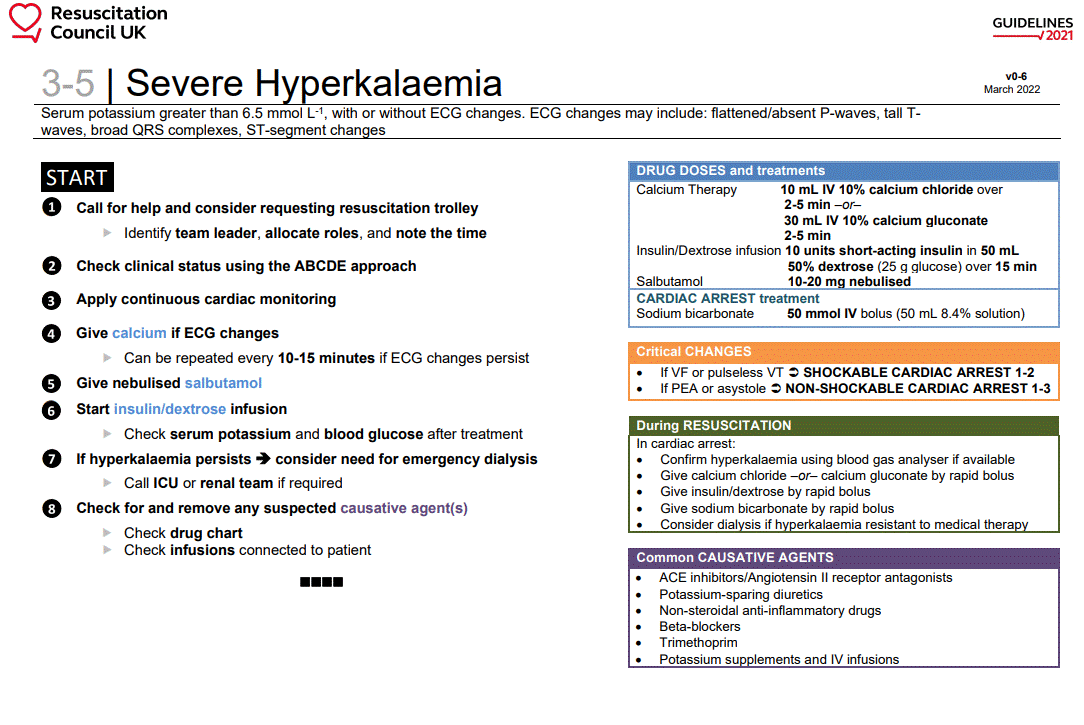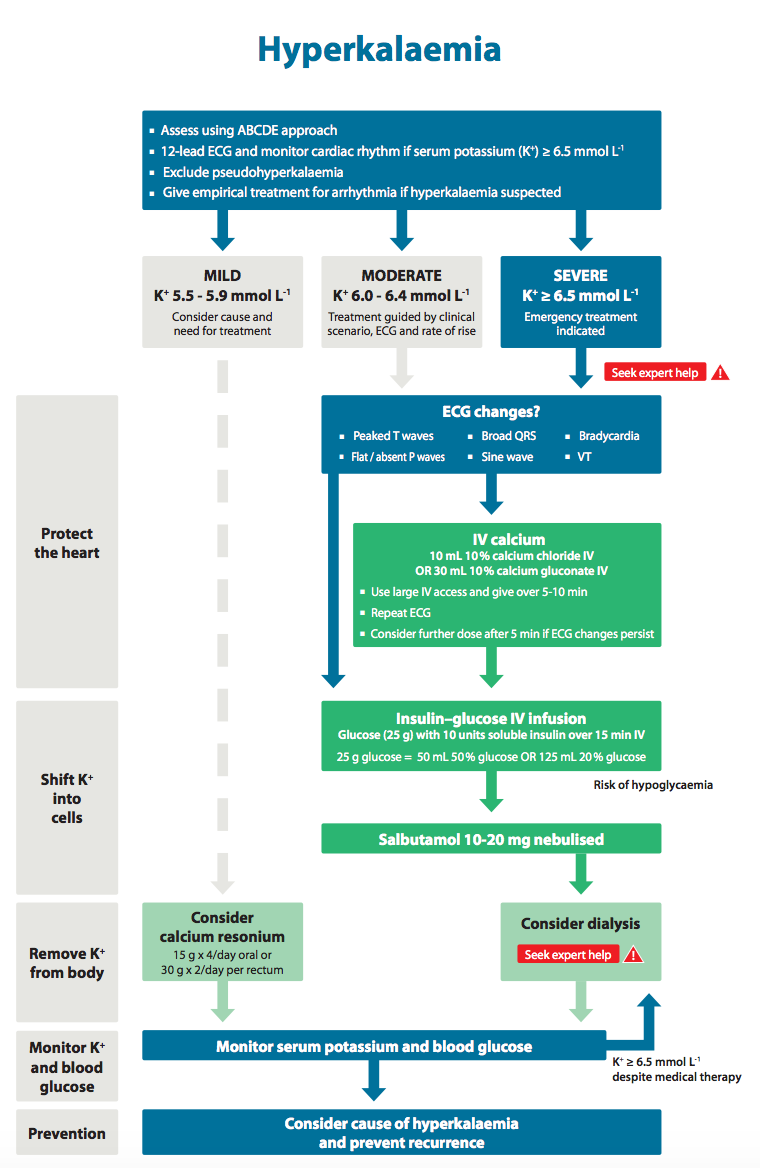Makindo Medical Notes"One small step for man, one large step for Makindo" |
|
|---|---|
| Download all this content in the Apps now Android App and Apple iPhone/Pad App | |
| MEDICAL DISCLAIMER: The contents are under continuing development and improvements and despite all efforts may contain errors of omission or fact. This is not to be used for the assessment, diagnosis, or management of patients. It should not be regarded as medical advice by healthcare workers or laypeople. It is for educational purposes only. Please adhere to your local protocols. Use the BNF for drug information. If you are unwell please seek urgent healthcare advice. If you do not accept this then please do not use the website. Makindo Ltd. |
Hyperkalaemia
-
| About | Anaesthetics and Critical Care | Anatomy | Biochemistry | Cardiology | Clinical Cases | CompSci | Crib | Dermatology | Differentials | Drugs | ENT | Electrocardiogram | Embryology | Emergency Medicine | Endocrinology | Ethics | Foundation Doctors | Gastroenterology | General Information | General Practice | Genetics | Geriatric Medicine | Guidelines | Haematology | Hepatology | Immunology | Infectious Diseases | Infographic | Investigations | Lists | Microbiology | Miscellaneous | Nephrology | Neuroanatomy | Neurology | Nutrition | OSCE | Obstetrics Gynaecology | Oncology | Ophthalmology | Oral Medicine and Dentistry | Paediatrics | Palliative | Pathology | Pharmacology | Physiology | Procedures | Psychiatry | Radiology | Respiratory | Resuscitation | Rheumatology | Statistics and Research | Stroke | Surgery | Toxicology | Trauma and Orthopaedics | Twitter | Urology
Related Subjects: |Hyperkalaemia |ECG - Hyperkalaemia |Hypokalemia |Hyperkalaemic and Hypokalaemic Periodic Paralysis |Resuscitation - Advanced Life Support |Action Potential
⚡ Hyperkalaemia is a medical emergency. Electrolyte abnormalities are part of the MLA. Rising plasma [K⁺] causes partial membrane depolarisation → inactivation of Na⁺ channels → risk of cardioplegia, muscle paralysis, and death. 💉 Calcium gluconate is preferred (less irritating to veins than calcium chloride).
| 🚑 Emergency Management: K⁺ >6.5 mmol/L or >6.0 mmol/L with ECG changes |
|---|
|

🧾 Clinical Features
- Often asymptomatic → 🫀 arrhythmias may be first sign
- Weakness, cramps, paraesthesia
- Hypotension, bradycardia → cardiac arrest
📊 Severity
- Mild: 5.5–5.9 mmol/L
- Moderate: 6.0–6.4 mmol/L
- Severe: ≥6.5 mmol/L or ECG changes → 🚨 emergency
🔬 Investigations
- FBC (haemolysis, anaemia), LDH
- CK (rhabdomyolysis)
- U&E, Ca, Mg; repeat if unexpected
- VBG/ABG (metabolic acidosis)
- ECG (tented T → sinewave → VT/VF)
⚕️ Management Summary
- Stop offending drugs 🚫
- IV access + fluids (unless overloaded)
- Calcium gluconate IV if ECG changes
- Insulin + glucose infusion
- Nebulised salbutamol
- Consider furosemide if volume status allows
- Resins (Lokelma) as bridge
- Repeat U&E q2h, ECG monitoring
- If refractory/severe → dialysis

💔 Hyperkalaemia in Cardiac Arrest
- Confirm K⁺ >6.5 mmol/L (blood gas)
- 10 mL 10% Calcium chloride IV bolus (can repeat)
- 10 U insulin + 25 g glucose IV bolus, then glucose infusion
- 50 mmol NaHCO₃ (50 mL 8.4%) IV if severe acidosis
- Dialysis if refractory
- Consider mechanical CPR device / ECLS if prolonged
📚 References
Cases — Hyperkalaemia
- Case 1: A 68-year-old man with CKD stage 4 and poorly controlled hypertension presents with muscle weakness. ECG shows tall, tented T-waves. Serum potassium is 6.8 mmol/L. Management: IV calcium gluconate for cardiac membrane stabilisation, IV insulin with dextrose to shift K⁺ intracellularly, nebulised salbutamol, and oral sodium zirconium cyclosilicate. Loop diuretic started, and his ramipril held.
Outcome: Potassium falls to 5.0 mmol/L over 6 hours, symptoms resolve, and he is discharged after nephrology review. - Case 2: A 42-year-old man with poorly controlled type 1 diabetes presents with vomiting and dehydration. Labs show diabetic ketoacidosis with potassium 7.2 mmol/L. ECG: absent P-waves, widened QRS. Management: IV calcium gluconate, insulin/dextrose infusion, aggressive fluid resuscitation with normal saline, and close cardiac monitoring. Outcome: As acidosis corrects, K⁺ shifts intracellularly and falls rapidly; potassium replacement is later required to prevent hypokalaemia. He recovers fully after 4 days in hospital.
- Case 3: A 79-year-old woman on spironolactone and an ACE inhibitor for heart failure presents after a collapse. Potassium 8.1 mmol/L. She is bradycardic (HR 38), hypotensive, and her ECG shows sine-wave complexes. Management: Immediate IV calcium chloride, repeated insulin/dextrose, IV sodium bicarbonate (metabolic acidosis present), and IV furosemide. Emergency haemodialysis organised. Outcome: ROSC achieved after transient cardiac arrest during dialysis initiation. Survives to discharge after 2 weeks but ACE inhibitor permanently discontinued.
Teaching Commentary 🧑⚕️
Hyperkalaemia is life-threatening because of its effects on cardiac conduction. Early ECG changes (tall T-waves, PR prolongation) progress to sine-wave and arrest. Management principles: 1) Stabilise the myocardium (calcium salts), 2) Shift potassium into cells (insulin/dextrose, salbutamol, bicarbonate if acidotic), 3) Remove potassium (resins, diuretics, dialysis). Case 1 shows chronic renal disease, Case 2 highlights acidosis-driven hyperkalaemia in DKA, and Case 3 demonstrates the deadly drug–renal interaction in elderly patients. Always treat both the serum potassium and the underlying cause.